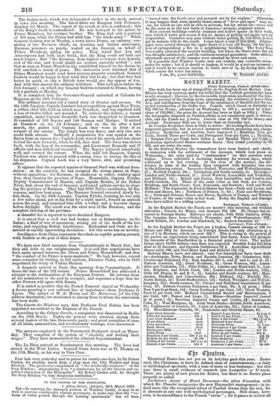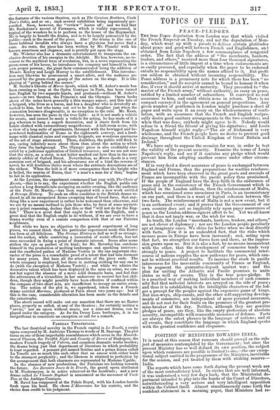Theatrical Easter has not put on its holyday,garb this year.
Easter used, like Christmas, to have its defined class of entertainment,—a fairy or mythological spectacle, with a tone of more or less burlesque : but this year there is small evidence of research into Lempriere or D'Anois. There are plenty of new pieces for Easter, but there is no Easter piece properly so called.
Buck-stone's Ascent of Mount Parnassus—the piece d'occasion with which Mr. Planche inaugurates the new Haymarket management—is in- deed more like the recognized school of Paschal drama than the rest, for it abounds at any rate with mythological personages. Still closer, how- ever, is its resemblance to the French "revue" ; for it passes in review all
the features of the various theatres, such as The Corsican Brothers, Uncle Tom's Cabin, and so on ; each several exhibition being ingeniously per- sonified. Soon, however, the "review" leaves off; and we find that Mr. Buckstone's ascent of Parnassus, which is visibly represented, is typical of the wonders he is to perform as the lessee of the Haymarket. 3de is largely to benefit the drama, and is to be largely patronized by the public—such is the moral of the piece. Alas ! the drama is like one of those habitual invalids who always have a physician but never find a cure. Au rests, the piece has been written by Mr. Planche with his brown smartness and elegance, and is prettily put upon the stage.
Mr. Webster also has a dramatic entertainment to inaugurate the ex- clusive devotion of his energies to the Adelphi. He has, however, no re- course to the mythical form of revelation, but, in a scene representing the green-room of his house, he introduces his company and himself in their own proper persona; the great facts communicated being the addition of Messrs. Keeley and Leigh Murray to the establishment. This introduc- tion may likewise be pronounced a smart affair, and the audience are amused by the green-room gossip of the actors on the stage. It is like playing at "going behind the scenes."
M. Scribe's libretto of Marco Spada, which with M. Auber's music has been running so long at the Opera Comique in Paris, has been turned into English by two separate hands, and produced—without M. Auber's music—at two theatres, the Princess's and the Olympic. Opera books shorn of the notes have generally a thin meagre aspect; and this tale of a brigand, who lives as a baron, and has a daughter who is devotedly at- tached to him, but who turns out not to be his daughter just when the connexion becomes disagreeable, is no exception to the rule. Mr. Kean, however, has seen the piece in the tree light : as it is not made a vehicle for music, and cannot be made a vehicle for acting, he has made of it a peg whereon to hang a superb decoration, and it starts forth from his hands clothed with extraordinary magnificence. A ball-room scene, with a view of a long suite of apartments, thronged with the bewigged and be- powdered fasbionables of Rome in the eighteenth century, and a land- scape with classical ruins and romantic brigands, are wondrous specimens of the art of stage adornment. These, doubtless, the public will flock to see, caring infinitely more about them than about the action to which they form the background. The Olympic piece is also creditably exe- cuted by a judicious application of limited resources ; and we are not sure that the story, as a story, is not better marked out here than in the more stately edifice of Oxford Street. Nevertheless, as Marco Spada is a very common sort of brigand, and his adventures are of a kind the reverse of novel, he will doubtless thrive most where the extrinsic decortions are of the richest. When the belt is of more consequence than the knight who is belted, the maxim of Burns, that "a man's a man for a' that," begins to fail in its application.
At the Lyceum, the experiment commenced last year with The Chain of Events,—that is to say, the experiment whether the English public can endure a long dramatic tale occupying an entire evening, like the audience of the Porte St. Martin,—has been repeated with a new work entitled A Strange History. To such an effete condition is the British drama re- duced in all its recognized forms excepting that of broad farce, that any- thing like a new experiment is rather to be welcomed than otherwise, and we are by no means inclined to join those who, by force of some mysteri- ous a priori reasoning, declare that this or that "will not do for the Eng- lish." There is a great deal that ought to do with the English, and a great deal that the English ought to do without, if we are ever to have a drama worthy even of a remote comparison with that of our Parisian neighbours.
But while we have no objection to the general experiment of long pieces, we cannot think that the particular experiment made this Easter has been at all felicitous. The Strange History is dull as well as strange; and the author, while contriving a succession of scenic effects, has not once succeeded in fixing a point of dramatic interest. Scene after scene strikes the eye as perfect of its kind ; for Mr. Beverley has outshone himself in the production of melting landscapes and sparkling interiors ; and the unaffected pathos of Madame Vestris in the one important cha- racter of the piece is a remarkable proof of a talent that had lain dormant for many years. But here all the attraction of the piece ends. The whole company is employed, but there is nothing striking for any one to do (with the exception of Madame Vestris) ; and while we admire the decorative talent which has been displayed in the miss en scene, we can- not but regret the absence of a more solid dramatic basis, and feel that the adventures of a vivandiere in her endeavour to recover her lost chil- dren, though they might possibly have been effective if confined within the compass of two short acts, are insufficient to occupy an entire even- ing. The notion of the plot is, we apprehend, taken from a French drame entitled Marlene, produced at Paris about two years ago : but if this is the case, considerable alteration has been made in the details and the catastrophe.
The above record will make out our assertion that there are no Easter pieces, properly so called, at any of the theatres ; for certainly neither a "revue," nor an opera without music, nor a nine-act drama, can be placed under the category. As for the Drury Lane burlesque, it is too insignificant to constitute an exception or call for a remark.



























 Previous page
Previous page